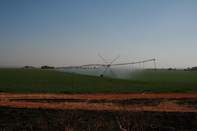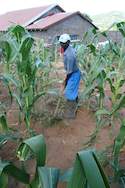Most of South Africa’s maize is propagated from hybrid seed, of which roughly eighty-five percent are biotech, also known as genetically modified. Commercial farmers buy new seed every year, since hybrids do not produce commercially viable yields when replanted.

Subsistence farmers may use open pollinated seeds, which can be saved and reused, or hybrids. Open-pollinated seed and saved seed do not have the same genetic potential as hybrid seed.
Hybridization in combination with improved production practices and precision farming has resulted in enormous productivity gains, with South Africa’s total average production for maize on dry and under irrigated land increasing from about one ton per hectare in the 1980s to somewhere between 4,8 tons to 5 tons per hectare over the past few years.
South Africa was the first country to grow biotech crops commercially and by 2010, was the ninth largest cultivator of biotech crops in the world. The development of biotech maize varieties has been a great breakthrough, helping to improve yields while reducing input costs.
Maize Cultivars

A whole range of maize cultivars exists with different properties in terms of the time they take to mature, adaptability to the different soil, climatic conditions and insect and disease tolerance.
To reduce risks, farmers generally plant a variety of different cultivars that are most suited to their unique production and climatic conditions. The release of short-season growers has helped to greatly reduce farmers' climatic risks, as these varieties need much less time to mature.
Most of South Africa’s white maize is milled, but some cultivars are picked early and are then sold as the fresh mielies that South Africans love to barbeque. Sweet corn, popcorn and baby corn are cultivars with specific traits.
To illustrate, sweet corn is a variety with high sugar and low carbohydrate content. Baby corn is a cultivar that produces small ears and popcorn is a variety that expands and puffs up when heated.